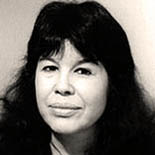 Marge Piercy (born March 31, 1936) is an American poet, novelist, and social activist. She is the author of the New York Times bestseller Gone to Soldiers, a sweeping historical novel set during World War II.
Marge Piercy (born March 31, 1936) is an American poet, novelist, and social activist. She is the author of the New York Times bestseller Gone to Soldiers, a sweeping historical novel set during World War II.
As of 2004 she is author of seventeen volumes of poems, among them The Moon is Always Female (1980, considered a feminist classic) and The Art of Blessing the Day (1999), as well as fifteen novels, one play (The Last White Class, co-authored with her third and current husband Ira Wood), one collection of essays (Parti-colored Blocks for a Quilt), one nonfiction book, and one memoir.
ECLIPSE AT THE SOLSTICE
Marge Pierce
New moon and the hottest sun:
It should be the day of the triumphant
sun marching like a red elephant
up the lapis arch of sky.
The moon is invisible, shy,
almost wounded. She draws
the thin short darkness around her
like a torn dress.
Then in the fat of the afternoon
she slides over the sun
enveloping him. I have
conquered, she croons,
brought darkness and put the birds
to sleep, raised the twilight wind.
But then his corona shines
around her and she sees.
You really are a lion with mane
of white, you beauty. So
she gives him the day back,
slowly, and lets him roar.
===========
THE FRIEND
Marge Piercy
We sat across the table.
he said, cut off your hands.
they are always poking at things.
they might touch me.
I said yes.
Food grew cold on the table.
he said, burn your body.
it is not clean and smells like sex.
it rubs my mind sore.
I said yes.
I love you, I said.
That’s very nice, he said
I like to be loved,
that makes me happy.
Have you cut off your hands yet?
=====
WET
Marge Piercy
Desire urges us on deeper
and farther into the coral maze
of the body, dense, tropical
where we cannot tell plant
from animal, mind from body
prey from predator, swaying
magenta, teal, green-golden
anemones weaving wide open.
The stronger lusts flash
corn rows of dagger teeth,
but the little desires slip,
sleek frisky neon flowers
into the corners of the eye.
The mouth tastes their strange
sweet and salty blood
burning the back of the tongue.
Deeper and deeper into
the thick warm translucence
where mind and body melt,
where we see with our tongues
and taste with our fingers;
there the horizon of excess
folds as we approach
into plains of not enough.
Now we are returned to ourselves
flung out on the beach
“exhausted, flanks heaving
out of oxygen and time,
grinning like childish daubs
of boats. Now it is sleep
draws us down, surrendered
to its dark glimmer.